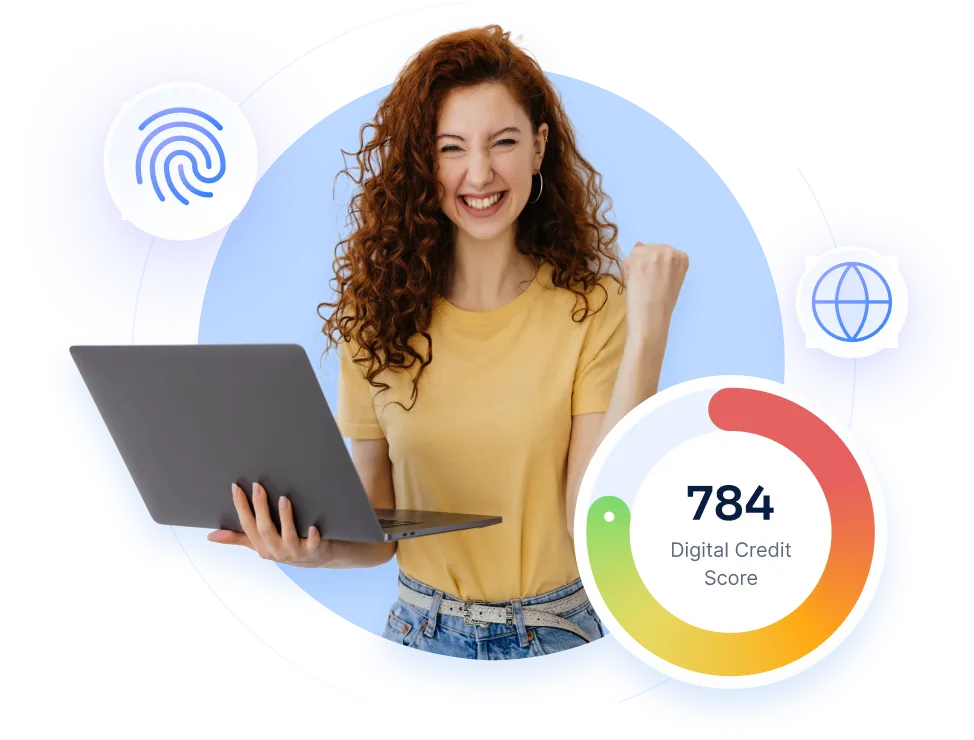How to Improve Credit Scoring in Nigeria Using Alternative Data
Explore the development of the lending industry in Nigeria and how non-traditional credit scoring is improving access to financial services.

According to Leadership, Nigeria's lending services penetration rate is the lowest among world countries.
This trend is developing because the unbanked population in Nigeria is 26% of the country's residents. It means that 28.8 million adult Nigerians have no credit history, making it impossible for banks to give them credit traditionally.
At the same time, the coverage of Nigerians of this state with financial services has nevertheless increased over the past four years.
It is primarily associated with the popularization of non-bank financial institutions using alternative credit data to assess creditworthiness.
Let’s discuss the role non-traditional credit scoring plays in Nigerian lending market, as well as how fintech in Nigeria is reshaping access to credit.
Nigeria’s economic landscape
Nigeria is among the top five African countries with the largest economies.

Its economy combines manufacturing, agriculture, and service sectors. Natural resource extraction is also developed.
However, certain economic problems in the country affect all financial sectors, including lending.
Inflation and low income in Nigeria
According to Reuters, Nigeria's economy is growing steadily, thanks to increased oil production and government reforms.
However, the measures taken are not enough at the moment – experts have recorded an inflation rate unprecedented in Nigeria. In January 2023, it was almost 30%.
This increase in inflation is accompanied by a low income level of Nigerians. The average salary in the country ranges from 80,000 to 150,000 Nigerian naira, or from $53 to $100 in equivalent.
Nigerian fintech loan growth
The trends described above lead to increasing demand for consumer loans, primarily to meet the population's basic needs.
The number of non-bank financial institutions in Nigeria is constantly growing, reflecting the broader Nigeria fintech boom, and they have taken advantage of this trend.
Current statistics state that there are 211 licensed lending institutions in the Nigerian market providing their services online.
Credit score challenges in Nigeria
In assessing potential borrowers, traditional banks in Nigeria rely on data from the three largest credit bureaus – Equifax, TransUnion, and Experian.
These bureaus collect financial information about borrowers and create a credit score based on it. This is what Nigerian banks take into account when deciding on a loan application.
The traditional approach to credit scoring with alternative data in Nigeria presents a unique set of challenges for banks. A major issue is that a large number of Nigerians cannot be assigned a credit score due to their lack of access to banking services.
To get a loan from a bank in Nigeria, you also need proof of official income. However, this is also a challenge for Nigerians as the country has a high unemployment rate.
According to Statista, more than 13% of Nigerian youth were not formally employed in 2022:

Fintech's impact on lending growth in Nigeria
Due to the difficulties faced by Nigerian banks, the development of lending in Nigeria is now focused on digital lenders.
These lenders create their scoring models using alternative data to evaluate borrowers. It allows them to lend to population categories without a credit history or official income.
Nigeria's fraudulent loan crisis
According to the data from the latest FITC report, the level of financial fraud in Nigeria is growing very fast.
In 2024, bank losses due to criminal activity increased by 277%, from N2.58 billion in the third quarter to N9.75 billion in the fourth.
According to information received from the same organization, the largest share of losses – 94.35% – comes from loans issued fraudulently.
How alternative data transforms credit institutions in Nigeria
Considering all of the above, we can make a reasonable conclusion about the critical value of alternative data for Nigeria.
This solution helps to solve several problems of the lending industry in this country:
1. Reduce the credit gap. A nontraditional credit score in Nigeria allows you to cover categories of the population with lending services without a credit history, official income, or access to banking products.
2. Prevent fraud. Scoring models based on alternative data help recognize the likelihood of fraud before a loan is issued, improving the efficiency of credit risk management.
Digital footprint analysis, which is offered to its clients by the RiskSeal scoring system, is especially relevant for Nigeria.
Non-traditional data sources relevant to Nigeria
Data in Nigeria is very limited.
At the same time, the country has a sufficient number of alternative data sources that credit institutions can use. This situation sets the stage for developing alternative credit scoring in Nigeria.
Useful alternative data sources for Nigerian lenders include:
Online activity of potential borrowers. According to forecasts, by the end of 2024, Nigeria will have more than 97 million Internet users:

Social media accounts. Statistics state that 43 million Nigerians are active users of social networks.
Paid subscriptions. According to the latest data, Nigeria has 2.6 million SVoD (subscription-based video-on-demand). This figure will increase to 3.8 million by 2028.
Mobile usage data. According to analysts, there are 222 million mobile subscribers in Nigeria. This source of alternative data can provide information about almost every resident of the country.

RiskSeal – reliable alternative data provider for Nigerian lenders
RiskSeal is a digital credit scoring system for Nigeria. By actively working with credit institutions across the country, we have become well-versed in the specifics of the African region.
The platform provides lenders with over 400 data points on each applicant, gathered by analyzing their digital footprints.

Clients just need to provide RiskSeal with the name, phone number, email, and IP address of the potential borrower.
Our digital credit scoring system will gather insights from more than 200 online services, including local Nigerian platforms:
- Marketplace: Jumia
- Classified: City
- Job search site: MyJobMag
- Real estate portals: PropertyPro, Private Property
- Gambling websites: Bet9ja, Betfair, and 7 other websites
- Mobile network providers: MTN, Globacom, Airtel, and 9 other operators
We continuously expand our range of alternative data sources to stay ahead in the Nigerian lending environment. The data sources listed above are current as of May 2024.

Download Your Free Resource
Get a practical, easy-to-use reference packed with insights you can apply right away.

Download Your Free Resource
Get a practical, easy-to-use reference packed with insights you can apply right away.




FAQ
What types of alternative data are available in Nigeria through RiskSeal?

RiskSeal gives Nigerians access to the following types of alternative data: Digital Credit scores, Trust/Fraud scores, solvency metrics, service statuses, specific data points from online services, face match, name match, and location match.
How does RiskSeal's service model benefit Nigerian credit organizations?

Due to digital footprint analysis, which RiskSeal specializes in, lending institutions can reduce the gap between the need for lending and the loans issued.
More specifically, the benefits of working with RiskSeal are as follows:
1. Enhanced credit risk assessment. We provide 400+ alternative data for each applicant.
2. Fraud prevention. We identify and red-flag suspicious accounts in real-time.
3. Improved approval rates. On average, RiskSeal helps companies increase approval rates by 25%.
4. Streamlined onboarding processes. RiskSeal has an excellent identity verification process. These are face match, name match, and location match analyses.
5. Cost efficiency. We help lenders save a lot on KYC checks. Savings – up to 30% of the budget for KYC.
6. Comprehensive customer insights. We provide a 360-degree view of potential customers, showing solvency metrics and financial habits.
What is the role of fintech in Nigeria’s economic development?

Fintech in Nigeria can help increase the coverage of the Nigerian population with credit services. It will reduce the credit gap, increase GDP, and strengthen the country's economy.
How significant is the credit gap in Nigeria’s consumer lending?

The minimum credit gap in consumer lending in Nigeria is 25.2 trillion naira, which is the equivalent of $16.5 million.
What challenges does Nigeria face regarding financial fraud?

Fraud is increasing in Nigeria, with financial institution losses due to criminal activity rising by 277% in one quarter of 2023.
Why are alternative data important for credit assessments in Nigeria?

Credit scoring based on alternative data allows Nigerian lenders to solve two problems simultaneously: effectively combat fraud and significantly reduce the credit gap.

.svg)

.webp)


.webp)
.webp)